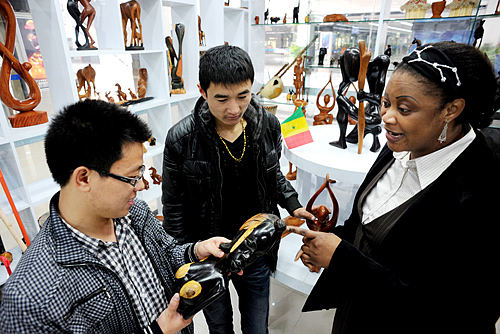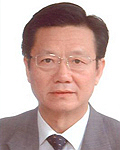|
 |
|
BENEFITS OF FREE TRADE: An African businesswoman introduces handicrafts to Chinese buyers in Yiwu, east China's Zhejiang Province, on April 18, 2011 (ZHANG JIANCHENG) |

Based on an "early harvest" plan hatched in late May, the 153 members of the WTO will focus on a package of assistance for the 48 least developed countries (LDCs) in the coming months in a bid to finalize an agreement by December.
After more than six months of negotiating, it has become clear that it is impossible to conclude the Doha Round free trade negotiations by the end of the year. The key problem lies in the differences between developed countries led by the United States and emerging economies in a series of major issues such as agricultural subsidies and tariffs on agricultural products.
The two sides also differed on non-agricultural market access, which resulted in a deadlock in the Doha Round, said EU Trade Commissioner Karel De Gucht. To push talks forward, the EU submitted new proposals on tariff cuts for chemical, mechanical and electronic products, while urging other parties to make a compromise. He criticized the United States for its lack of interest in the Doha Round.
De Gucht's remarks were rejected by U.S. representatives, who said U.S. industrial and commercial communities welcomed progress in the Doha Round and expected the parties would start discussions on trade climate issues unresolved in the Doha Round as soon as possible.
Apparently, the EU's efforts didn't succeed, and the hope that the Doha Round negotiations could be completed by the end of this year is now in tatters.
Early harvest
In this context, an early harvest plan was put forward with the purpose of enabling the LDCs to benefit from the Doha Round by implementing policies in their favor. These policies, agreed upon during the WTO Ministerial Conference in Hong Kong in 2005, would give quota-free and duty-free market access to these countries' products.
As the world's poorest countries, the LDCs take up a small share of the world trade volume. Opening markets to them will not endanger the interests of other countries. Therefore, this deal is feasible and can help ease the deadlock of the Doha Round.
China and other emerging economies responded positively to the deal. Although it has a population of 150 million people living in absolute poverty, China has continued to help the LDCs to reduce their poverty.
In keeping with the requirements of the Hong Kong conference, China has opened its market to the LDCs. Since 2008, China has been the LDCs' biggest export destination, importing 23 percent of their total exports. From 2000 to 2009, China's imports from these countries saw an average annual growth of 24 percent.
Yi Xiaozhun, China's Ambassador to the WTO, recently said China would provide quota-free and duty-free treatment for 95 percent of the LDCs' products entering the Chinese market.
The early harvest plan, however, seems inconceivable for the United States and other Western countries. The United States has already set a series of preconditions for the deal. For instance, it demanded the LDCs eliminate fishery subsidies, reduce tariffs on clean energy products and reduce barriers for clean energy services. On the reduction of cotton subsidies, the United States made it clear that there were difficulties and that it would consider the issue together with other issues.
The United States has cast a shadow on the prospects of the early harvest plan. Even if the U.S. Government signs the final agreement, it will not be easily passed by the U.S. Congress. Take the United States' free trade agreements with Panama, Colombia and South Korea for example. Though signed by the U.S. Government, they have been put in the waiting list of the U.S. Congress for several years.
| 